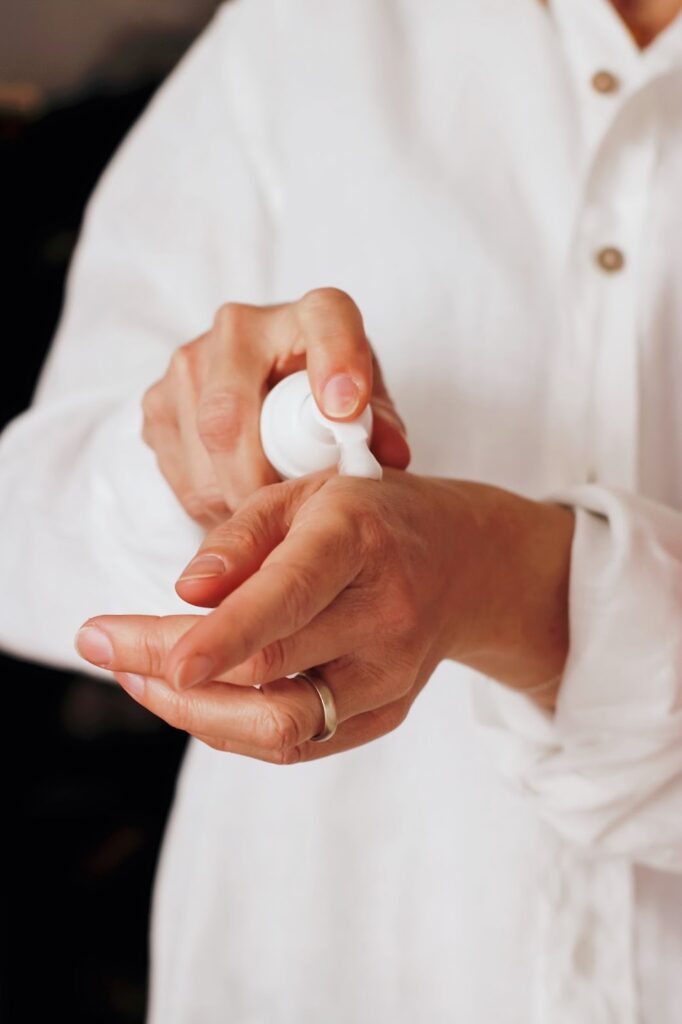- As you age, your ovaries begin to produce less estrogen. As the body adjusts to lower hormone levels, many women experience the physical and psychological changes associated with menopause.
- Common menopause symptoms include hot flashes, insomnia, weight gain, memory changes, vaginal dryness, mood swings, and low libido.
- While many alternative therapies can help alleviate menopause and perimenopause symptoms, you might want to consult a doctor if you’re experiencing heart palpitations or frequent urination for treatment and diagnosis.
Millions of women go through menopause every year, but that doesn’t mean experiencing it yourself is any less significant. In fact, this natural process comes with a host of physical and mood symptoms which can greatly impact your daily life. From poor sleep to urinary symptoms to changes in sexual function, menopause symptoms can be challenging for midlife women to deal with.
If menopause symptoms are affecting your quality of life, you might be wondering if any alternative treatments are available to make the time of menopause easier to manage. For some women, simple lifestyle changes can help alleviate the more pronounced symptoms. For others, medical treatment or hormone replacement therapy is the only option.
In this article, we’ll look into the different things that you can do to improve the way you experience menopause and its mental and physical symptoms.
What is Menopause?
Menopause is the physical representation of the end of the reproductive ability for a woman. It’s technically diagnosed when a woman has not experienced her monthly period for more than 12 months. Generally, menopause naturally occurs around age 51, but any time between ages 42–58 years is normal.
Some women may experience early menopause, or menopause before the age of 45. Early menopause is usually due to pre-existing conditions such as rheumatoid arthritis or irritable bowel disease. Early menopause might also be a result of the removal of your ovaries or uterus or due to chemotherapy treatment. Menopause before the age of 40 is called premature menopause. Only about 1% of women experience premature menopause, while 5% of women experience early menopause. (1)
Why Does Menopause Happen?
Unlike men, women aren’t born with the ability to reproduce—the reproductive cycle starts at puberty and ends with menopause. Why does this cycle occur?
It all comes down to hormones. As you age, your ovaries begin to produce less estrogen. Damage to the ovaries, like from an injury or medical treatment such as chemotherapy or radiation, can also reduce your body’s estrogen levels. (2) Low estrogen levels cause irregular periods that eventually stop altogether. As the body adjusts to lower hormone levels, many women experience the physical and psychological changes associated with menopause.
Menopause is a gradual process; your monthly periods will first become irregular before stopping completely. The stages of menopause include perimenopause, menopause, and postmenopause.
Perimenopause
Perimenopause is the first stage of the menopausal transition, and it may begin 8 to 10 years before menopause. This transitional phase usually starts in the early 40s, but for some women it occurs in the late 30s. In this stage, your ovaries begin to produce less estrogen. Over the years, the drop in estrogen levels accelerates; by the last 2 years of perimenopause, the ovaries stop releasing eggs.
Perimenopause lasts until menopause begins. Some people start experiencing the symptoms of menopause during this stage. Even though the process of menopause has begun, you will still get monthly periods (although they may be irregular), and you can get still get pregnant.
Menopause
When you haven’t had a menstrual period for a whole year, you have begun menopause. Once menopause begins, women can no longer become pregnant. Estrogen levels drop to their lowest in this stage, and the ovaries stop releasing eggs. This period of time is when menopause symptoms are most intense.
Postmenopause
Postmenopause is the stage after menopause. During this stage, the symptoms of menopause begin to ease until they gradually disappear.
Postmenopausal women have very low estrogen levels, which puts them at risk for osteoporosis (bone loss) or cardiovascular diseases like heart disease. Therapy or lifestyle changes such as a healthy diet and regular exercise can help reduce the risk of developing these conditions.
Common Symptoms of Menopause
Many symptoms may occur when you are going through menopause, but their intensity and frequency vary from one woman to another. Symptoms usually start appearing during late perimenopause and last until postmenopause. Many women experience these common symptoms during menopause:
- Hot flashes
- Night sweats
- Vaginal discomfort during sex
- Vaginal dryness
- Irregular vaginal bleeding or unusual discharge
- Sleeplessness
- Frequent urination
- Weight gain
- Depression or anxiety
- Mood swings
- Irritability
- Dry mouth and dry skin
- Nausea

During perimenopause, women may experience different symptoms including:
- Breast tenderness
- Irregular periods
- Heavier or lighter than usual menstrual periods
- Premenstrual syndrome (PMS) that is worse than usual
While less common, some women also experience some or all of the following symptoms:
- Headaches, muscle pain, or joint pain
- Hair loss or thinning
- Sexual dysfunction or lowered sexual desire
- Increased heart rate
- Temporary memory loss or lapses
- Difficulty concentrating
How To Treat Menopause Symptoms Naturally
Knowing how to deal with menopause is not easy for everyone. While many alternative therapies can help alleviate menopause and perimenopause symptoms, you might want to consult a doctor if you’re experiencing heart palpitations or frequent urination for treatment and diagnosis.
Hot Flashes
Hot flashes are among the most common symptoms of menopause. In fact, over 80% of women experience hot flashes of varying frequency and severity during and after menopause. (3)
A hot flash is how your body responds to a sudden change in your body temperature. According to research, low estrogen levels increase the brain’s sensitivity to temperature changes. (4) The brain’s hypothalamus is responsible for controlling your body temperature. If the hypothalamus thinks your body is too hot, it tries to cool itself by sweating, which can suddenly make you feel extremely hot. Most women that experience hot flashes have them daily.
Hot flashes can be very severe in about 15% of women, especially those who have had surgical menopause or are on certain medications. For instance, tamoxifen, a cancer treatment, is known to cause hot flashes.
Hot flashes that occur during sleep are called night sweats. These may disrupt your sleep, especially for those with severe hot flashes. (5) Night sweats can cause fatigue and mood changes due to disrupted sleep.
How To Deal With Hot Flashes in Menopause
A number of things might make your hot flashes symptoms worse. Avoiding activities that exacerbate hot flashes can help prevent them from occurring. Try:
- Avoiding spicy foods, alcohol, and caffeinated beverages
- Drinking plenty of water
- Managing your stress levels
To minimize the severity of hot flashes when they occur, try:
- Staying away from direct sun
- Regulating the room temperature
- Using cold packs under your pillow
- Dressing in layers
- Taking slow, deep breaths using a technique called paced respiration (6)
- Consuming herbal products and dietary supplements, such as plant-based phytoestrogens
For people with severe hot flashes, medical treatment may be necessary to reduce their intensity. Research shows short-term hormone therapy can be quite beneficial for hot flashes. (7) Prescription medication such as fluoxetine (Prozac) and paroxetine (Paxil) may also help. Doctors may also prescribe clonidine and gabapentin in some cases. As with any prescription, side effects may occur.
Weight Gain
Estrogen is directly related to the regulation of bone health and cholesterol levels. As estrogen levels drop during menopause, lean muscle mass in the body decreases and cholesterol levels increase, leading to weight gain in some women. Additionally, the development of insulin resistance, lower metabolic activity, and genetics can also cause weight gain during menopause.
How To Deal With Weight Gain in Menopause
Although it seems quite challenging to lose weight during menopause, there are many strategies you can use to maintain a healthy weight. Regular physical activity can help, as can eating a balanced diet. Research confirms that a Paleo diet can help postmenopausal women lose weight, as can a Mediterranean diet or a blue zone diet.(8,9) These healthy diets are nutrient-rich and higher in proteins than carbohydrates, helping manage menopausal weight gain.
Vaginal Changes
Some postmenopausal women experience vaginal dryness, irritation, or discomfort during sex. The changes in sex during menopause are related to the body’s drop in estrogen, which causes thinning of the vaginal lining and reduced vaginal secretions. Some women also experience thinning and inflammation in the walls of the vagina, a condition called atrophic vaginitis. (10) Although these conditions are a symptom of menopause, they might also happen for other reasons, so you should consult your doctor if you’re experiencing them.
How To Deal With Vaginal Changes in Menopause
Probiotics for vaginal health improve the health of your vagina by optimizing your vaginal pH and restoring your normal vaginal flora. Vaginal changes might also be countered with several over-the-counter products such as vaginal lubricants and water-based lubricant creams, which can help with dryness and reduce irritation. Vaginal hormonal creams are another option, although these require a prescription from a doctor.
Mood Swings and Depression
Mood swings are a common symptom of perimenopause. (11) Fluctuating hormone levels may disrupt your body’s natural serotonin levels, increasing mood swings and your risk for depression.
How To Deal With Mood Swings and Depression in Menopause
Make time for stress-control techniques like yoga or meditation. Exercise regularly and prioritize sleep, since tiredness can make you more irritable, anxious, or depressed. Menopause probiotics may also help, since gut health is closely related to mental health. Some antidepressant medications, such as selective serotonin reuptake inhibitors (SSRIs), can effectively moderate mood swings. (12) Additionally, black cohosh has been found to improve mood in menopausal people. (13)
Insomnia
During menopause, 61% of women experience disrupted sleep or insomnia. (14) Sudden hot flashes and night sweats can cause you to lose a good night’s sleep; even if you don’t wake up, menopause may cause you to be tired during the day.
How To Deal With Insomnia in Menopause
Insomnia is a frustrating condition. If you’re experiencing trouble with sleep during menopause, try:
- Exercising regularly
- Doing yoga
- Meditating
- Setting a low room temperature at nighttime
- Putting cold bags under your pillow
- Talking to your doctor about taking antidepressants
- Getting treatment for hot flashes, like hormone replacement therapy

Irregular Periods and PMS
If you’re suddenly experiencing a change in your menstrual period, you might be going through perimenopause. Irregular periods, a change in period discharge (lighter or heavier), and more severe PMS symptoms are all common during perimenopause due to your body’s changing estrogen levels.
How To Deal With PMS in Menopause
Switching to a diet rich in nutrients and avoiding triggers such as smoking, alcohol intake, and caffeinated beverages may help minimize PMS symptoms due to menopause, as can thermal (heat) and cryo (cold) therapies.
Hormonal birth control methods, like birth control pills and IUDs, can also help regulate your period and control excessive vaginal bleeding.
Memory and Concentration Problems
Many women in menopause report brain fog, difficulty concentrating, and memory loss. The hormonal changes associated with menopause can actually affect your cognitive function, as can other menopause-related factors like stress or depression.
How To Deal With Memory Problems in Menopause
To improve your focus and concentration during menopause:
- Stay physically active
- Exercise regularly
- Take supplements to improve your brain health
- Challenge your brain with activities like chess or crossword puzzles
Low Sex Drive
As the walls of your vagina become thinner and more sensitive during menopause, you may experience pain and discomfort during sex. Add all the hormonal changes to the mix, and you’re suddenly much less excited about the idea of physical intimacy than you were prior to menopause.
In fact, your sex drive may decline during menopause for a variety of reasons:
- Low estrogen may reduce blood in the genitals, which can affect vaginal sensation
- Vaginal dryness or thinning can make intercourse painful
- Sleep problems can decrease your energy for sex
- Urinary incontinence may cause embarrassment around your partner
- Weight gain and changing body image can also lower your sex drive
How To Deal With Low Sex Drive in Menopause
If your low sex drive is due to vaginal discomfort, hormone therapy might help reduce your symptoms. If you’re struggling with body image or low libido, consulting a sex therapist can help you regain comfort and intimacy.
Urinary Incontinence
Between 30% and 40% of middle-aged women experience urinary incontinence. (15) Low estrogen levels can cause the lining of the urethra to thin, which can cause:
- A more frequent need to urinate
- A sudden urge to urinate, even if your bladder is not full
- Pain during urination
- Urine leakage when sneezing, coughing, or laughing
How To Deal With Urinary Incontinence in Menopause
While urinary incontinence may be embarrassing, it’s an extremely common condition in postmenopausal women. Fortunately, if you’re dealing with this issue, there are things you can do to minimize its occurrence.
- Avoid diuretic beverages such as tea, coffee, alcohol and citrus juices
- Practice exercises for your pelvic floor muscles, such as Kegel exercises
- Use topical estrogens
Happy V Products Make Managing Menopause Easier
About 1.3 million women in the U.S. go into menopause each year. While many of them experience at least some menopausal symptoms, including weight gain, hot flashes, night sweats, and mood swings, disruptions to daily life during menopause are not inevitable. Lifestyle changes, medications, and natural supplements can help reduce the severity of menopause symptoms.
Happy V’s targeted products help to naturally balance hormone levels during puberty, middle age, and menopause, keeping you—and your vagina!—happy and healthy during every life change.
- https://my.clevelandclinic.org/health/diseases/21138-premature-and-early-menopause#:~:text=Premature%20menopause%20happens%20to%20about,in%20about%205%25%20of%20women.
- https://www.menopause.org.au/hp/information-sheets/early-menopause-due-to-chemotherapy-radiotherapy
- https://www.ncbi.nlm.nih.gov/pmc/articles/PMC6459071/
- https://www.mayoclinic.org/diseases-conditions/hot-flashes/symptoms-causes/syc-20352790#:~:text=But%20most%20research%20suggests%20that,flash%20%E2%80%94%20to%20cool%20you%20down
- https://jamanetwork.com/journals/jamainternalmedicine/article-abstract/410513
- https://pubmed.ncbi.nlm.nih.gov/22990758/
- https://www.menopause.org/for-women/menopauseflashes/menopause-symptoms-and-treatments/the-experts-do-agree-about-hormone-therapy
- https://www.researchgate.net/publication/259959767_Long-term_effects_of_a_Palaeolithic-type_diet_in_obese_postmenopausal_women_A_2-year_randomized_trial
- https://pubmed.ncbi.nlm.nih.gov/32979767/
- https://www.wsh.nhs.uk/CMS-Documents/Patient-leaflets/Gynaecology/6647-1-Atrophic-vaginitis-genitourinary-syndrome-of-the-menopause-GSM.pdf
- https://www.ncbi.nlm.nih.gov/pmc/articles/PMC3197240/
- https://www.ncbi.nlm.nih.gov/pmc/articles/PMC6739239/
- https://health.clevelandclinic.org/what-is-black-cohosh/
- https://www.sleepfoundation.org/women-sleep/menopause-and-sleep
- https://www.ncbi.nlm.nih.gov/pmc/articles/PMC6528037/




